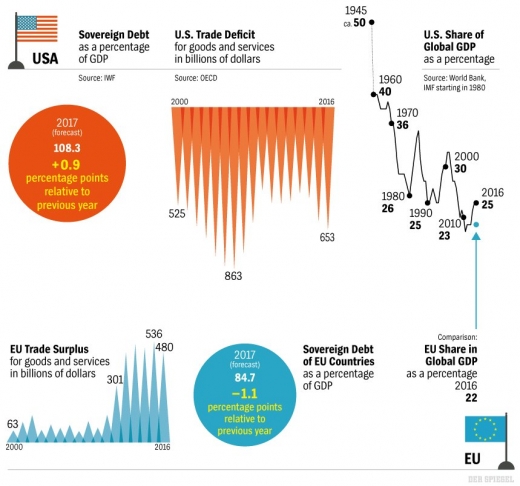
How inseparable is Europe and the USA? Are we codependents? Does the US dollar create world dependence on the USA?
Globalization is the reality of success, and promise, not a threat or burden if done right.
"America can’t be first without Europe"
The U.S. and EU are stronger together. Darko Vojinovic/AP March 24, 2017
http://theconversation.com/america-cant-be-first-without-europe-75109
"The bottom line – based on our many year of experience as diplomats, policymakers and researchers on transatlantic issues – is that the U.S. needs a strong economic and political partnership with Europe to advance its own economic well-being and address vexing international and regional issues. Such a partnership would be enormously more difficult to maintain without the EU’s single voice, something Washington would be wise to remember."
Tweety does not understand this opinion.
"On the diplomatic front, it is true, the complicated institutional makeup of the EU often means slow decision-making, and it becomes very hard when competencies and authorities at the EU conflict with those of the member states: for example, in fighting terrorism or dealing with refugees. The EU has taken major strides to improve this, such as by establishing a high representative to speak for members in a range of regional situations. The EU has been an active partner on Ukraine, Iran, the Middle East and Afghanistan, for example.
Despite the remaining shortcomings, in other words, the EU is still a much stronger foreign policy partner for the U.S. today than in the past. If the EU were not there to contribute significant resources to help deal with major humanitarian crises, handle the fallout of conflicts and terror and bolster the prospects for peace and stability in countries like Ukraine, a much greater burden would fall on the United States."
"Why Europe needs America, a little"
Constanze Stelzenmüller Tuesday, September 29, 2015
https://www.brookings.edu/blog/order-from-chaos/2015/09/29/why-europe-needs-america-a-little/
"In reality, the U.S. and European governments have not worked so closely together on key security issues, nor so successfully, in quite a while. Washington, Berlin, Paris, Warsaw, and other European capitals hammered out a consensus on sanctions against Russia, and those sanctions remain in place. NATO is ramping up its capabilities, and several European governments (including Germany) are increasing their defense budgets. And achieving the Iran deal required considerable cooperation among American, British, French, German, and Russian negotiators."
The Iran deal went away for Tweety so maybe the cooperation between the EU and the US is done.
"China and Europe are moving forward without Trump"
by Jethro Mullen and Charles Riley @CNNMoney June 1, 2017
http://money.cnn.com/2017/05/31/news/economy/china-europe-eu-trump-us-trade/index.html
"Beijing is in prime position to capitalize on major policy fissures that have emerged between Europe and the Trump administration on climate, trade and defense. "
"EU Worries Grow over U.S. Economic Chaos"
Under Donald Trump's leadership, the U.S. is in the process of forfeiting its position of economic supremacy. An internal EU document shows that the Europeans are worried.
By Christian Reiermann 11 Sep 2017
http://www.spiegel.de/international/world/eu-worries-over-u-s-economy-grow-a-1166809.html
"Stanley Fischer, the 73-year-old vice chair of the US Federal Reserve, is familiar with the decline of the world's rich. He spent his childhood and youth in the British protectorate of Rhodesia, in present-day Zambia and Zimbabwe, before going to London in the early 1960s for his university studies. There, he experienced first-hand the unravelling of the British Empire.
History repeats itself, sometimes even within a single person's lifespan. Now an American citizen, Fischer is currently witnessing another major power taking its leave of the world stage. Under the leadership of President Donald Trump, the United States is losing its status as a global hegemonic power, he said recently. America's role as guarantor of global organizations like the International Monetary Fund (IMF) can no longer be taken for granted, Fischer says. "I had a picture of the world economy in which the United States was an anchor," he recently told the Financial Times. "Not a source of volatility.""
More.
"For decades, the United States was something of a guarantor of global economic stability. It helped Western Europe emerge from the rubble of World War II with a massive redevelopment program, the Marshall Plan. Whenever there was a financial crisis somewhere in the world, the U.S. Treasury Department and the IMF joined forces to orchestrate supporting measures. When the worst world economic crisis in 80 years erupted in 2008, the Americans led the globally coordinated rescue effort.
Little is left of that dominant position. The United States, a former superstar, is now fighting to stay in the top league. The economic policy coming out of Donald Trump's Washington is characterized by timidity and despondency, sometimes erupting into boastful nationalism. The former economic superpower has embarked on a self-prescribed retreat. Once the home of the Washington Consensus, a policy that emphasized international cooperation, competition and market forces, the U.S. capital is now beset by economic navel gazing."
